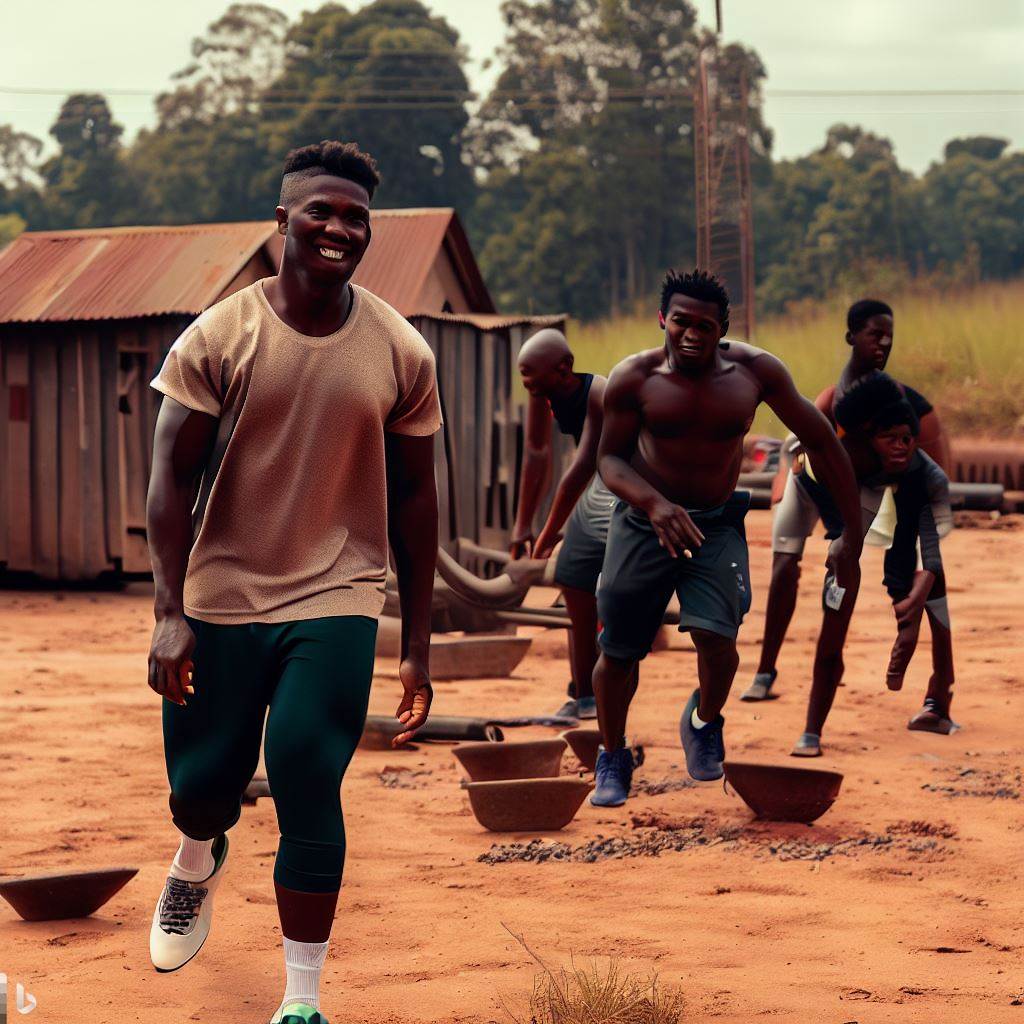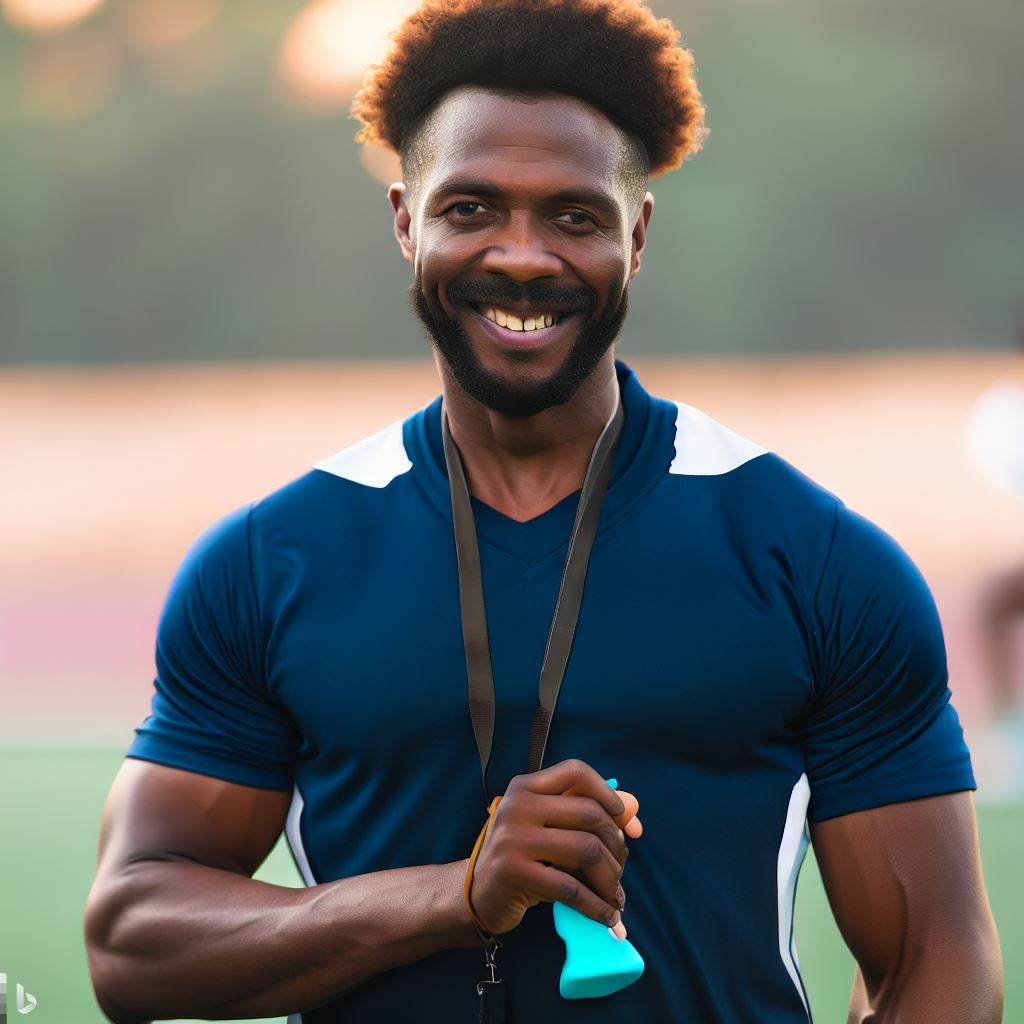Introduction
Rural areas in Nigeria are characterized by their agricultural activities and underdeveloped infrastructure.
Urban areas in Nigeria are known for their population density and advanced infrastructure.
Athletic training plays a crucial role in promoting physical fitness and improving performance in sports.
It helps prevent injuries, enhances endurance and strength, and fosters healthy competition among athletes.
In Nigeria, athletic training is particularly important due to the country’s passion for sports and success in international competitions.
Given the contrasting characteristics of rural and urban areas, the availability and quality of athletic training can differ significantly.
In rural areas, access to proper training facilities, equipment, and qualified trainers may be limited.
This can hinder the development and potential of talented athletes from these regions.
Urban areas, on the other hand, tend to have better resources and opportunities for athletic training.
Well-equipped sports facilities, specialized coaches, and exposure to competitive events are readily available.
This allows athletes in urban areas to have a competitive advantage and showcase their talents more effectively.
Understanding the differences between rural and urban athletic training in Nigeria is crucial for addressing inequalities.
Efforts should be made to improve access to athletic training in rural areas and provide equal opportunities for talent development.
In the following sections, we will explore various aspects of athletic training in rural and urban areas in Nigeria.
By identifying the disparities and potential solutions, we can work towards a more inclusive and balanced athletic culture.
Overview of Athletic Training in Rural Nigeria
Athletic training plays a crucial role in the development and success of athletes in Nigeria.
However, the stark differences between rural and urban areas in terms of resources and opportunities have created significant disparities in athletic training and its outcomes.
In this article, we will delve into the specific challenges faced by athletes in rural areas and the impact these challenges have on their development and performance.
Challenges faced in rural areas
- Limited access to facilities and equipment: Rural communities often lack proper sports infrastructure, including well-equipped training facilities, tracks, and sports fields. This limited access significantly hinders athletes’ ability to train effectively and develop their skills.
- Lack of qualified trainers and coaches: Rural areas suffer from a shortage of qualified trainers and coaches who possess the knowledge and expertise to provide proper guidance and training. This dearth of professionals limits athletes’ access to quality coaching and mentoring.
- Insufficient funding for sports programs: Rural sports programs struggle to secure adequate funding, leading to a lack of resources for training, equipment, and infrastructure development. This financial constraint restricts the potential growth and opportunities for athletes in rural areas.
Impact on athletes’ development and performance
- Limited opportunities for skill development: The scarcity of facilities and qualified trainers in rural areas directly hampers athletes’ skill development. Without access to proper training resources, athletes are unable to enhance their techniques and abilities to their fullest potential.
- Lack of exposure to high-level competition: Rural areas have fewer opportunities for athletes to compete at a high level and gain exposure. This lack of exposure denies athletes the chance to showcase their talents and compete against top-caliber opponents, hindering their growth and development.
- Potential for talent being overlooked: Due to the challenges faced in rural areas, talented athletes often go unnoticed or underappreciated. The lack of resources, funding, and exposure make it difficult for scouts and talent spotters to identify and nurture potential stars, resulting in missed opportunities for athletes in these communities.
In essence, the disparities between rural and urban areas in Nigeria are evident in the realm of athletic training.
Limited access to facilities and equipment, coupled with a lack of qualified trainers and coaches, as well as insufficient funding, pose significant challenges for athletes in rural areas.
These challenges, in turn, impact athletes’ development and performance by limiting skill development opportunities, restricting exposure to high-level competition, and potentially overlooking talented individuals.
Addressing these disparities is crucial to ensuring equal access to athletic training and providing opportunities for athletes in rural Nigeria to thrive and excel in their chosen sports.
Read: Athletic Trainer in Nigeria: A Day in the Life
Overview of Athletic Training in Urban Nigeria
In urban areas of Nigeria, the athletic training scene boasts numerous advantages compared to rural areas.
From the availability of state-of-the-art facilities to the presence of well-trained trainers and coaches, the urban regions provide a conducive environment for athletes to flourish.
Access to modern training facilities plays a crucial role in enhancing performance.
Urban areas in Nigeria are equipped with top-notch facilities that include well-maintained tracks, gymnasiums, and sports complexes.
These facilities offer athletes a conducive space to train and refine their skills.
Transform Your Career in Nigeria
Discover unmatched expertise with our personalized Career Consulting service. Navigate Nigeria’s job market with a strategy tailored just for you.
Get StartedFurthermore, the availability of advanced equipment and technology empowers athletes to push their boundaries.
Urban training centers in Nigeria are equipped with high-tech training equipment that aids in precise measurement of performance metrics, thus enabling athletes to track their progress and make necessary adjustments to achieve optimal results.
The presence of qualified trainers and coaches is another key advantage of urban athletic training in Nigeria.
These trainers possess expertise in various sports disciplines and have experience working with athletes of different levels.
Their guidance and personalized coaching significantly contribute to enhancing athletes’ skills and techniques, ultimately leading to improved performance.
In terms of opportunities for development and performance, urban areas provide athletes with a distinct edge.
Exposure to high-level competition is readily available in urban regions, where regular tournaments and championships take place.
Athletes get the chance to compete against skilled opponents, which helps them sharpen their skills, develop a competitive spirit, and gain valuable experience.
Urban areas also offer access to specialized training programs designed to target specific aspects of an athlete’s performance.
Whether it’s strength and conditioning, agility training, or sport-specific techniques, these programs cater to athletes’ individual needs, allowing them to advance their skills in a focused and structured manner.
Moreover, the supportive sports culture and infrastructure prevalent in urban areas create an environment conducive to athletic success.
From financial support to sponsorship opportunities, urban centers provide athletes with the necessary resources and backing to excel in their respective sports.
This supportive ecosystem fosters a sense of belonging and motivation among athletes, driving them to reach new heights.
Basically, urban Nigeria’s athletic training scene stands out due to the availability of modern facilities, advanced equipment, qualified trainers, and coaches.
The opportunities for athletes’ development, such as exposure to high-level competition, specialized training programs, and a supportive sports culture, further cement urban areas’ position as the ideal training ground for aspiring athletes.
Read: The Growth of Event Management in Nigeria’s Economy

Comparison of Rural and Urban Athletic Training
In the athletic realm, Nigeria boasts both rural and urban areas that offer training opportunities for aspiring athletes.
While the experiences may differ, each setting has its own advantages and disadvantages.
Rural training, characterized by its close-knit community support, provides athletes with unique benefits.
Firstly, the tight community fosters a supportive environment where athletes can rely on their neighbors for encouragement and assistance. This sense of unity can propel individuals towards their goals.
Moreover, rural areas offer natural and diverse training environments.
Athletes can take advantage of the varied landscapes, such as hills, forests, and open fields, to enhance their physical conditioning and adaptability.
These natural settings contribute to the development of well-rounded athletes.
Additionally, rural training holds the potential for discovering hidden talent.
Publish Your Professional Profile, Business or Brand
Showcase your expertise, gain trust, and boost visibility instantly on Professions.ng.
Publish NowWith fewer athletes vying for attention, talented individuals may find it easier to stand out and attract the attention of scouts and talent spotters.
This can provide opportunities for athletes who may not have been noticed in highly competitive urban settings.
On the other hand, urban training presents its own set of advantages.
Athletes training in urban areas have access to top-notch facilities and equipment.
State-of-the-art gyms, tracks, and sports complexes offer athletes the tools they need to train at the highest level.
This access to cutting-edge resources can greatly enhance their performance and facilitate skill development.
Furthermore, urban athletes regularly face high-level competition.
The presence of numerous competitive athletes in close proximity exposes them to a challenging environment.
This exposure pushes athletes to constantly improve and gives them an accurate gauge of their abilities, preparing them for national and international competitions.
Urban areas also provide specialized coaching and training programs that cater to specific sports.
Athletes can benefit from the expertise of experienced coaches who have a deep understanding of their respective disciplines.
These specialized programs can accelerate skill development and maximize performance potential.
On the flip side, rural training does have its drawbacks. Limited resources and funding can hinder athletes’ progress.
The lack of financial support often means athletes in rural areas do not have access to the same opportunities as their urban counterparts.
This disparity can manifest in inadequate equipment, facilities, and even transportation, which affect training quality and results.
Additionally, rural areas may lack experienced trainers and coaches.
The limited pool of qualified professionals in these areas can hinder athletes’ development.
Without proper guidance and direction, athletes may struggle to reach their full potential and may miss out on crucial technical and tactical training.
Moreover, rural training offers limited exposure to higher levels of competition.
The absence of regular, high-stakes competitions hampers athletes’ ability to measure their performance against top-tier opponents.
This restricts their growth and may hinder their chances of getting scouted by national or international teams.
Urban training, though advantageous, is not without its downsides.
Intense competition for limited resources, such as facility usage and funding, can strain athletes and organizations.
The pressure to secure adequate resources to maintain peak performance can be daunting and may affect athletes’ mental and physical well-being.
Furthermore, urban athletes face the pressure to meet high expectations.
The competitive nature of urban training environments leads to heightened scrutiny and demands.
Athletes may feel immense pressure to consistently perform at a high level, which can negatively impact their confidence and motivation.
Additionally, the intense training and pressure associated with urban athletic environments can potentially lead to athlete burnout.
The constant demands and expectations, coupled with the physical toll of training, may exhaust athletes emotionally and physically.
This burnout can undermine performance and even lead to injuries.
Essentially, choosing between rural and urban athletic training in Nigeria depends on several factors.
Rural training offers advantages such as community support, diverse environments, and hidden talent discovery.
Meanwhile, urban training provides access to top-notch facilities, high-level competition exposure, and specialized coaching.
However, both settings come with their disadvantages, including limited resources and funding in rural areas and intense competition and pressure in urban areas.
Ultimately, athletes must weigh these considerations and select the training environment that aligns with their individual goals and circumstances.
Read: Challenges Facing Strength Coaches in Nigeria
Strategies to Improve Rural Athletic Training in Nigeria
Government intervention and funding
- Government should allocate more funds to support athletic training in rural areas.
- Increased funding will enable the establishment of better training facilities and resources.
- Government support can promote the development of local sports talent in rural communities.
- Efforts should be made to ensure equal distribution of funds to reach all rural regions.
Partnerships with NGOs and sports organizations
- Collaboration with NGOs and sports organizations can provide additional resources and expertise.
- NGOs can help in organizing training camps, workshops, and competitions in rural areas.
- Sports organizations can offer mentorship programs and scholarships to talented athletes.
- Partnerships can contribute to the overall development of athletic training infrastructure in rural Nigeria.
Training and capacity-building programs for coaches
- Coaches play a vital role in nurturing athletic talent, and their skills need improvement.
- Training programs should focus on equipping coaches with the latest techniques and knowledge.
- Capacity-building initiatives can empower coaches to better train and guide rural athletes.
- Continuous education and workshops can keep coaches updated with best practices.
Mobile training units to reach remote areas
- Mobile training units can bring training facilities directly to remote rural communities.
- These units can provide access to training equipment, medical support, and expert coaches.
- Mobile units will help bridge the gap between urban and rural athletic training opportunities.
- Regular visits by mobile units can ensure consistent development of rural athletes.
In essence, improving rural athletic training in Nigeria requires a multi-faceted approach involving government intervention, partnerships, training programs, and mobile units.
Adequate funding, support from NGOs and sports organizations, capacity-building for coaches, and mobile training units are essential to bridge the gap between urban and rural areas.
By implementing these strategies, Nigeria can nurture and uplift talented athletes from rural communities, ultimately contributing to the overall development of sports in the country.
Read: Youth and Sports: The Role of Athletic Trainers in Nigeria
Publish Your Professional Profile, Business or Brand
Showcase your expertise, gain trust, and boost visibility instantly on Professions.ng.
Publish NowDelve into the Subject: The Ethical Side of Sports Nutrition in Nigeria
Conclusion
In summary, the disparities between rural and urban athletic training in Nigeria are evident.
Rural areas lack proper facilities, equipment, and qualified coaches, hindering the development of athletes.
It is crucial to bridge this gap to ensure the overall growth of Nigerian athletes.
By investing in rural athletic training, stakeholders can discover and nurture untapped talent that may otherwise go unnoticed.
Therefore, a call to action is necessary.
It is time for stakeholders, including government agencies, sports associations, and corporate bodies, to prioritize investing in rural athletic training.
Such investment will not only empower athletes but also contribute to the development of sports in Nigeria as a whole.




